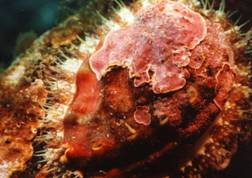Deterring Abalone Poachers with Stiff Penalties
June 2007

The stiffest penalties for abalone poaching in Canada’s history were handed down in April 2007 to three men caught by DFO Enforcement Officers illegally harvesting the threatened B.C. mollusc.
The Prince Rupert, B.C. convictions were also the first abalone poaching convictions under the Species at Risk Act. Northern abalone is protected as a threatened species under the Act, and is also protected by the Fisheries Act.
The poaching ring-leader was sentenced to a conditional sentence of 12 months, including six months house arrest, a five-year scuba-diving ban, and a $20,000 fine. He also forfeited his Ford F-150 pickup truck, boat, and equipment used during the crime, valued together at $143,000.
The convictions came from a major bust in February 2006. Working from a tip, and a 72-hour stake-out, DFO fishery officers intercepted a pickup truck carrying 11,000 dying abalone – making this the largest abalone poaching arrest in Canada’s history.
The other two men were sentenced to three months house arrest, 80 hours community service work that will involve presentations on abalone conservation, $10,000 fines, and forfeiture of $4000 of equipment.
The fines will likely be directed to community abalone groups on Haida Gwaii (Queen Charlotte Islands), and First Nations community-based abalone recovery projects.
Northern abalone, a marine mollusc found in B.C.’s coastal waters, has been protected since 2003 by the federal Species at Risk Act. But largely because of illegal poaching, in spite of a harvest ban in place since 1990, its population continues to decline.
“We can see extinction,” says Laurie Convey, chair of the recovery team for abalone. “It’s very upsetting.” Convey says that if poaching is curbed, the abalone restocking programs along the coast could recover this species before its numbers reach that fatal collapse.
This is why the hefty deterrent penalties and diligent enforcement efforts are so welcomed. Hopefully, if poachers decide the risks are too great, the effervescent abalone will again shine brightly through B.C.'s shallow coastal waters.
- Date modified: